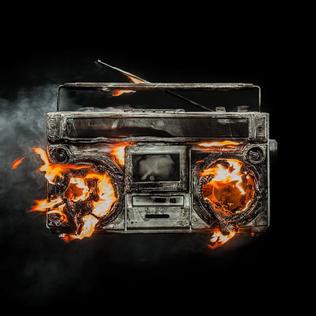Time passes by quicker than we can ever begin to realize.
In the blink of an eye, you’re in your freshman year of college. Blink again, and you’re sitting at graduation. Before any of us know it, we are already looking back on how our lives have turned out. American rock band Green Day has manifested this feeling in its new album, Revolution Radio.
At this point, Green Day has been around the block (or boulevard) more than a few times. Frontman Billie Joe Armstrong and company released their first album over 25 years ago, and in Revolution Radio, the band reflects on some of its past experiences and how it has evolved.
RELATED: Review: Energetic St. Lucia hit The Rialto Theatre but the Tuesday crowd couldn’t keep up
Green Day doesn’t acknowledge what the future will bring, which creates what feels like a love letter to the past.
Armstrong acknowledges the inevitability of death in the album opener “Somewhere Now,” as he sings “We all die in threes.” Green Day has three members. Very clever, Armstrong.
Many of the songs on this album seem more mature than some of what Green Day has produced over the years, but the band also throws in some songs reminiscent of its youthful American Idiot days.
“Bang Bang” and “Outlaws” sounds like everything fans would expect from a classic Green Day track.
RELATED: S U R V I V E, the band behind “Stranger Things” brought its dark sound to Tucson
Armstrong seems to sing about a girl from his past in “Youngblood” and when he says, “she’s my little Youngblood,” the song feels like a continuation of “She’s a Rebel,” from American Idiot. Green Day does like to build on its previous work, seeming like its 26-year career could easily unfold as a singular narrative story.
Throughout the album, the band takes a more mature approach to its catchy punk-rock sound, but ultimately feels like a classic Green Day album. Title track “Revolution Radio” provides much of the youthful angst and denial of mainstream culture that the band has always poured into their music, while “Troubled Times” feels insightful and reflective, looking at the changing nature of the world and where the band fits within that change.
The closing song on the album, “Ordinary World,” is slow, poetic and sentimental, closing the record on a somber, but satisfactory note.
Green Day still injects their definitive angst into the sound. While probably not quite as mad as the band was 15 years ago, the trio still has anger to unleash through their music, but what exactly about seems unclear.
Still, Armstrong embodies several personas with various songs throughout the album, similar to earlier Green Day concept albums like American Idiot and 21st Century Breakdown.
Every song on here has something unique about it, but throughout the band’s 12 studio albums, its sound has begun to homogenize.
But Revolution Radio still feels fresh and mature. Its thematic nature allows the members of Green Day to reflect on their discontent with time catching up with them, while it also is a major step for their future artistic endeavors.
Time catches up with all of us eventually, and that’s why bands like Green Day, though through a filter of pessimism, show us how to take a step back and reflect.
Follow Alec Kuehnle on Twitter









